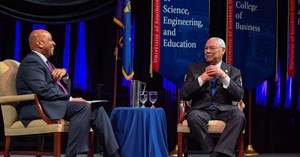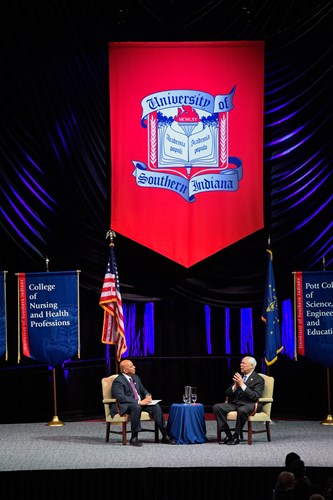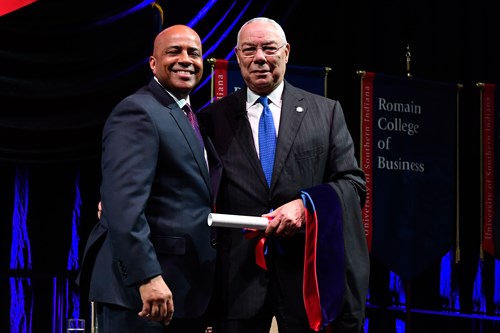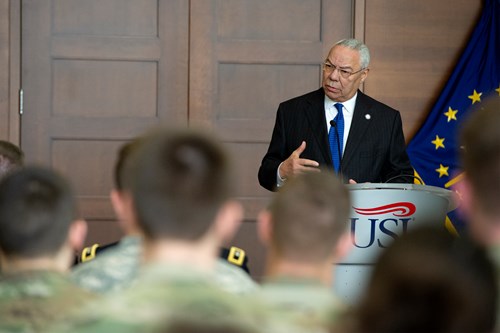
On the eve of his inauguration as the fourth president of the University of Southern Indiana, sitting across from General Colin L. Powell, USA (Ret.) on the eve of his 82nd birthday, Dr. Ronald Rochon told a buoyed crowd inside the freshly-opened Screaming Eagles Arena that it was a night he would never forget.
It was also a night that—full disclosure—made him a little tense.
“I’ve been nervous all day,” Rochon admitted, prompting laughs from the Romain College of Business Innovative Speaker Series audience and a joke from Powell that the president should “drop down and give 10.”
“I’ll give you five,” Rochon countered.
In the end, no pushups were attempted. Instead, the audience watched and listened as a man shaped on the south side of Chicago in the 1970s sought the insights and advice of a man brought up in the South Bronx in the 1940s.
 Over the course of an hour, Powell offered his thoughts on everything from diversity in higher education (“If you are a public school and you do not have a student body that reflects what the public looks like, then you’re not doing your job”) to division in the Middle East (“I see no solution in sight… I think it’s going to continue to be a problem for a long, long period of time, and there’s no immediate solution.”)
Over the course of an hour, Powell offered his thoughts on everything from diversity in higher education (“If you are a public school and you do not have a student body that reflects what the public looks like, then you’re not doing your job”) to division in the Middle East (“I see no solution in sight… I think it’s going to continue to be a problem for a long, long period of time, and there’s no immediate solution.”)
He weighed in on Russia, China and North Korea. On immigration and segregation. On partisan politics and why he won’t be running for president. “It wouldn’t work, politically. I didn’t have the passion in me to be a politician,” Powell said.
He even humored a question about aliens, playfully placing his finger to his lips as if he had a secret.
But one of the more relatable moments of the evening came when the Four-Star General and former Secretary of State, chairman of the Joint Chiefs of Staff and National Security Advisor opened up about something many try, sometimes at serious costs, to hide: failure. “Every young person should fail,” Powell said. “I did things wrong, and I had to be corrected. But doing wrong doesn’t mean there’s anything wrong with you. It’s just, do it right next time.”
That message hit home for Darlene Short, a sixth-grade language arts teacher at Castle North Middle School who brought a group of 50 students to the program.
“Success happens through failures,” she said. “You don’t automatically always get things easily. And so, I loved that he talked about that, because our “A” students, they can’t make a “B” without just falling apart sometimes.”
“I was one of those kids. I got “As” and “Bs” in high school, and now in college, it’s a lot harder,” added Claudia Labhart ’22, a USI student majoring in biology and German. “I’m maybe not doing as good, but it’s not the end of the world. You just have to keep moving, and that was really inspirational. That’s something I feel like I’ll think about a lot now.”
Brandon Ragland, who was a teenager the first time he heard Powell speak in Evansville, attended Thursday’s event with his 16-year-old daughter, Jazmine, a student at Harrison High School. “I think that he pretty much put it in my daughter’s mind that, hey, that’s part of the ingredients of your success. It kind of reiterates what I try to share with her a lot. I always say, ‘I don’t speak from a platform of perfection, it was because of my problems that I’ve had that I can be able to find solutions now.’”
 Even in his retirement from public service, Powell continues to look for solutions, too. He’s passionate about education and spoke about the school he opened at his alma mater, City College of New York, about a mile from where he was born in Harlem. He’s been to each of the 12 schools in the United States that bear his name.
Even in his retirement from public service, Powell continues to look for solutions, too. He’s passionate about education and spoke about the school he opened at his alma mater, City College of New York, about a mile from where he was born in Harlem. He’s been to each of the 12 schools in the United States that bear his name.
“It means more to see my name over an elementary school than it does to wear a medal,” Powell said. “What I remind myself all the time is that I can’t change anything in the past...The only thing I really can change is the future. And the future that is in this country, they are our children. And we can’t afford to waste that.”
Just weeks ago, some of those children—Darlene Short’s students from Castle North—were reading about Powell in their classroom. Thursday, they sat feet away from him, waving as he prepared to go on stage. (He waved back.)
“This is a once-in-a-lifetime opportunity. No other sixth-grade class is going to have the opportunity to read about a person in their textbook and then go actually hear him speak. To make that connection, that real-world connection, is invaluable,” Short said.
Powell, who wrote an instant New York Times best seller about leadership (It Worked for Me: In Life & Leadership), shared a story that changed his mindset on the topic decades ago when he was a first lieutenant. He’d been so caught up about his own promotion that he failed to give one of the men in his unit the boost in rank he had earned. “I was ashamed of myself,” Powell said.
 He never forgot his error. But, instead of worrying, he learned. “I always remember that I’m second,” said Powell. “Whether you’re in the Army, in the band, any human occupation where you’re leading people. Remember, it’s the people you’re leading who are the important ones. You can be replaced overnight, easy.”
He never forgot his error. But, instead of worrying, he learned. “I always remember that I’m second,” said Powell. “Whether you’re in the Army, in the band, any human occupation where you’re leading people. Remember, it’s the people you’re leading who are the important ones. You can be replaced overnight, easy.”
No one, however, can replace the history Colin Powell has both made and been a part of while serving 35 years in the United States Army and under four U.S. presidents. Which is why, just before the night ended, Powell, once the brigade commander of the 101st Airborne Division nicknamed the “Screaming Eagles,” earned another honor to add to his vast collection: an honorary Doctor of Laws degree from the University of Southern Indiana.
“I’m deeply honored. I really appreciate it,” Powell said, in closing. “I hope I can get back here sometime.”
The Romain College of Business Innovative Speaker Series is sponsored by the Romain College of Business and the USI Foundation. Previous speakers include T. Boone Pickens, legendary entrepreneur and philanthropist in 2013; Dr. Ben Bernanke, former chairman of the Federal Reserve in 2015; and Dr. Oscar Salazar, founding chief technology officer of Uber in 2017.